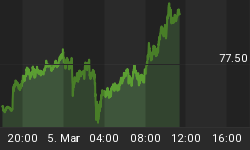Below are excerpts from recent commentaries posted at www.speculative-investor.com.
The irrelevance of "Peak Gold"
It is said that the cure for high commodity prices is...high commodity prices, the reason being that a high price encourages more production and thus eventually brings about a price decline. However, gold's 10-year (and counting) bull market has not yet prompted an increase in the gold-mining industry's output. In fact, the production of newly mined gold has tapered-off over the past decade, causing some gold-mining analysts and company executives to claim that "Peak Gold" is at hand. As is supposedly the case in the oil patch, the idea is that the ability of the gold mining industry to ramp-up supply in response to a rising price is being constrained by physics and geology.
We doubt that "Peak Gold" is upon us. It takes a decade or more for the gold-mining industry to respond to major changes in gold's price trend, so the modest decline in production of the past several years is probably due to reduced exploration activity during the 1990s and the first few years of the 2000s. However, we don't want to get into a debate about whether "Peak Gold" is a valid theory or not because the concept of a gold production peak is not meaningful. The reasons are detailed in our November-2009 article titled "Why changes in gold production don't matter".
The crux of the issue is that most of the gold mined in the past has not been consumed (burnt, eaten, used-up in industrial processes or built into structures); rather, it remains available today in readily saleable form. Consequently, gold-mine supply adds only about 1.5% per year to the total supply of gold, and changes in mine supply have very little influence on gold's supply/demand equation. For instance, if every gold mine in the world closed down tomorrow it wouldn't make a big difference to gold's 5-year price outlook. Such news would undoubtedly prompt a violent knee-jerk reaction, but the price would eventually settle at a level that reflected the loss of only a 1.5%/year contribution to total supply.
By way of further explanation, imagine that gold were money. In this case, the contribution to total supply made by the mining industry would be the monetary inflation rate. If the inflation rate were zero, that is, if the gold-mining industry ceased to exist, then gold's purchasing power would tend to increase over the long-term at roughly the same rate as the economy grew. For example, if, during a 20-year period, there were no money (gold) supply growth and average annual economic growth of 3% then gold's purchasing power would be expected to gain a total of about 80% (3%/year compounded for 20 years) over the course of this period. At no stage would there be a shortage of money (gold), assuming that prices were permitted to freely adjust.
Today, gold is not money, but it can be analysed as if it were. In fact, in order to draw correct conclusions it MUST be analysed as if it were money. This involves looking at gold-mine supply as a small addition to the total aboveground supply.
Just when we thought we'd heard it all...
Just when we thought we were beyond being surprised by anything a central banker could say, a senior Australian central banker proved us wrong. In a speech reported in a 23rd February Mineweb article, Ric Battellino, the Deputy Governor of the Reserve Bank of Australia, stated that mining booms cause inflation (inflation, here, meaning a rise in the general price level). And how did he come to that conclusion? He noticed that mining booms have always coincided with periods of high inflation. This made us wonder if he believes that a rooster crowing causes the sun to rise.
Battellino's comments on the relationship between mining booms and inflation are so silly they could easily be mistaken for satire. Unfortunately, he was being serious. He is either a really bad liar (a good liar wouldn't tell such a ridiculous tale), or his understanding of cause and effect is embarrassingly inadequate.
A mining boom will, of course, typically coincide with an unusually steep upward trend in the general price level because both are set in motion by a rapid increase in the money supply. In other words, the mining boom and the rise in the general price level are both effects of central-bank manipulation of money. Looking at it from a different angle, investment booms couldn't get very far and there could not be large increases in the general price level unless the central bank first pushed interest rates down to an artificially low level and then supplied whatever amount of new money was needed to maintain the low interest rates.
We aren't offering a free trial subscription at this time, but free samples of our work (excerpts from our regular commentaries) can be viewed at: http://www.speculative-investor.com/new/freesamples.html.
















